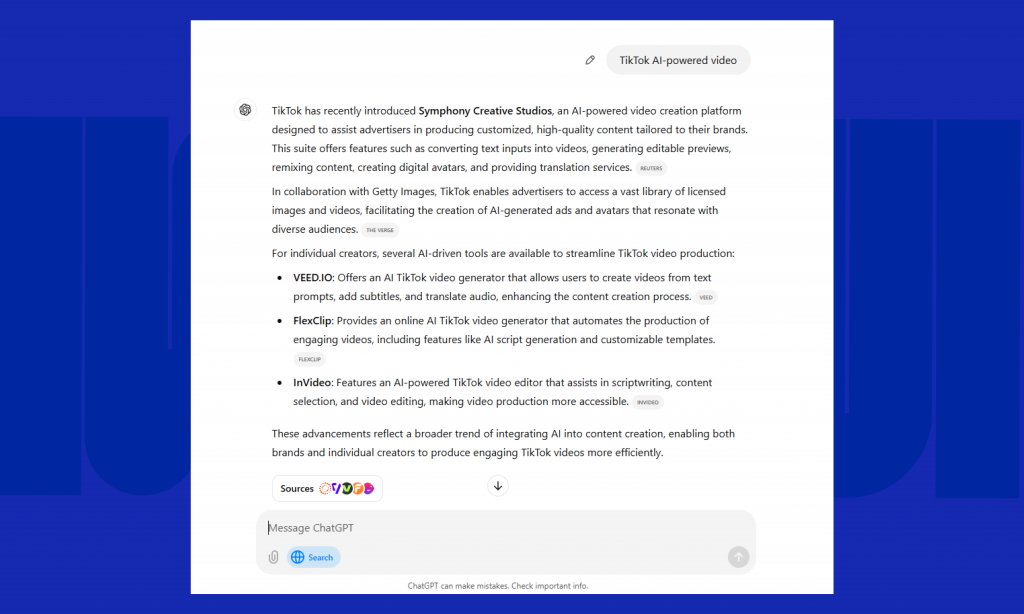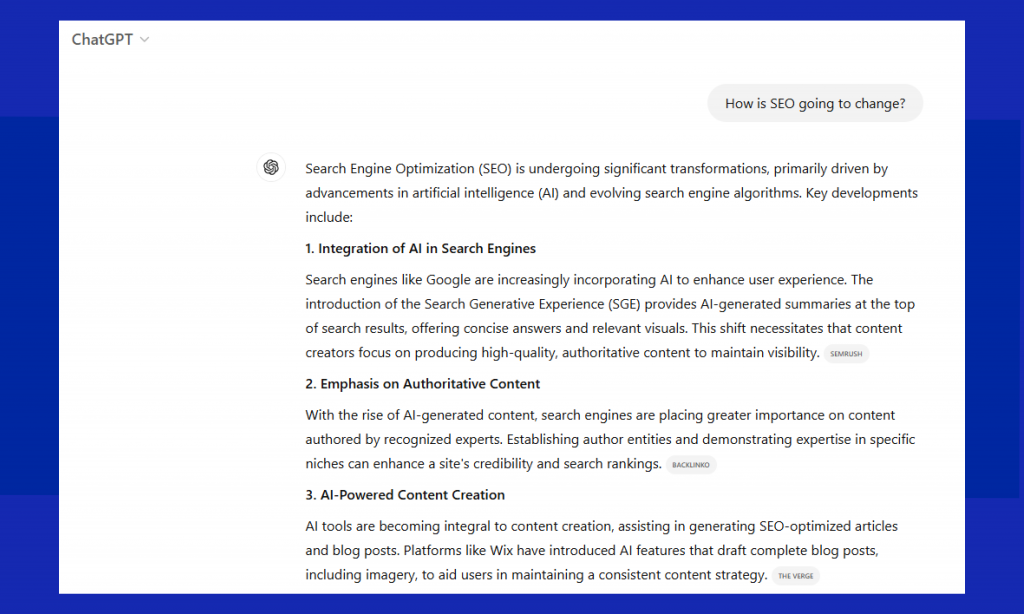On 31st October, 2024, OpenAI launched the ChatGPT Search engine, which will compete with Google or Bing. All good, but what about SEO optimization? How are we going to win this new search engine?
User search behavior is changing.
ChatGPT is, as expected, different from the other search engines. When users type in a query, their search results aren’t a list of links, but instead they receive complex answers that give a conversational experience, which has the link to the source at the end of each paragraph. Here’s how it looks:

This means that users can get the information needed with a zero-click search, meaning they can find out ”what are the best 10 things to do in one day in London” without clicking on even one link.
From a SEO point of view, the focus is shifting from simply achieving high rankings to offering unique, valuable insights that conversational AI can recognize as relevant. How are we going to do that? Definitely not by using lots of keywords like we are used to. Users might search „Where can I eat Italian food in a cozy, instagramable place in London?” instead of „italian restaurant London” and that can change a lot the way we do SEO.
The new rules.
SEO optimization is going to be evaluated by answering the question ”What does ChatGPT Search think is important for a user on a certain topic?”.
ChatGPT Search prioritizes content that offers unique insights, in-depth analysis, and clear, authoritative answers. So, in order to be among the favorites, you should stop writing articles by the old SEO rules. Instead, write content that solves real user problems and adds tangible value, invest in proper research and answer in detail to the questions that the users have.
The classic FAQs might no longer be so useful for SEO, as generic content might not attract traffic since the answer will be provided by the ChatGPT Search chat. For example, if you provide marketing info and you write a blog post about „How to create a marketing campaign” the AI might find this info on several other sources. That’s why a more insightful piece with the title „Create a quick christmas marketing campaign for brand awareness” would help the AI provide a more specific search result.
Another tip is to use a natural language and write in a simple way. The algorithm favors conversational and contextually rich responses and that’s why you should keep this in mind while doing SEO optimization. Your content should answer directly and naturally the questions that the AI search engine would probably receive.
Instead of indexing „social media trends 2025”, you could try a more natural approach like „what are the most popular social media trends that small businesses should use in 2025?”. Briefly, content must focus on user intent—the underlying goal or need that drives a search query.
The old rules that still apply.
Fortunately, there are still some SEO principles that apply to the new search engine optimization.
The classic SEO structure based on bullet points, subheadings, and concise summaries is still desirable. Well-structured and easy-to-digest content is easier to extract by ChatGPT and you should keep using them.
At the same time, AI prioritizes sources that it deems trustworthy and authoritative. So, it is expected that the answers provided by it would be focused on sources that have authority and are known for the high-quality content. But, you should focus more on building credibility by showcasing real expertise through author bios, testimonials from experts and links to credible studies.
The zero-click search.
The shift to zero-click search will totally change the traditional web traffic goals. So, what’s the point of being among the websites chosen by the AI? Well, it is all about visibility and brand awareness. If your website is among the ones that are listed in frequent search results, then it may help you become a trustworthy source of information in a certain domain, which might translate in sales and a bigger community of fans.
What will happen to AI generated content?
Since everybody’s got used to a little (or more, depending from case to case) help from AI content writers like Chat GPT or Gemini, we might have already produced lots and lots of AI generated content. But ChatGPT Search seems to not appreciate that. The AI needs new content to keep providing natural and relevant answers, so it will surely prioritize unique and authentic content when choosing sources for the search results. So you should get back to writing your blog posts by yourself. And, a little inside advice from us, it’s better for your brand too, because your community will appreciate your effort and authenticity.
Our conclusion.
SEO has not become obsolete, but it surely changes a lot because of ChatGPT Search. Once again, we need to adapt to the rapid evolution of technology and keep up with the AI that is becoming more present in our lives than ever. But, surprisingly, we, as content creators, will have to use it less and bring back the old school type of writing if we want to be liked by the new SEO algorithm.
And here’s what ChatGPT has to say about it:

If you need help in crafting the perfect strategy for your brand, leave us a message.


